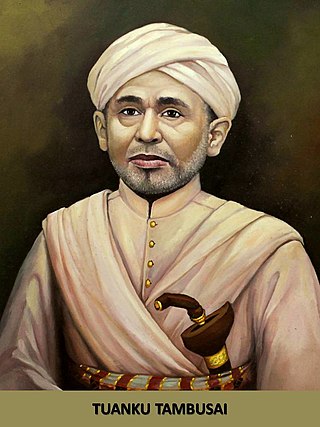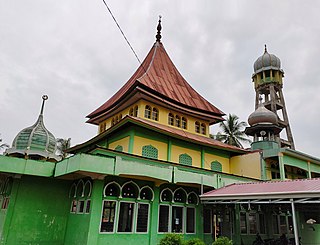
Tuanku Imam Bonjol, also known as Muhammad Syahab, Peto Syarif, and Malim Basa, was one of the most popular leaders of the Padri movement in Central Sumatra. He was declared a National Hero of Indonesia.

Minangkabau people, also known as Minang, are an Austronesian ethnic group native to the Minangkabau Highlands of West Sumatra, Indonesia. The Minangkabau's West Sumatera homelands was the seat of the Pagaruyung Kingdom, believed by early historians to have been the cradle of the Malay race, and the location of the Padri War.

The Padri War was fought from 1803 until 1837 in West Sumatra, Indonesia between the Padri and the Adat. The Padri were Muslim clerics from Sumatra who wanted to impose Sharia in Minangkabau in West Sumatra, Indonesia. The Adat comprised the Minangkabau nobility and traditional chiefs. They asked for the help of the Dutch, who intervened in 1821 and helped the nobility defeat the Padri faction.

West Sumatra is a province of Indonesia. It is on the west coast of the island of Sumatra and includes the Mentawai Islands off that coast. West Sumatra borders the Indian Ocean to the west, as well as the provinces of North Sumatra to the north, Riau to the northeast, Jambi to the southeast, and Bengkulu to the south. The province has an area of 42,119.54 km2 (16,262.45 sq mi), with a population of 5,534,472 at the 2020 census. The official estimate at mid 2022 was 5,640,629. The province is subdivided into twelve regencies and seven cities. It has relatively more cities than other provinces outside Java, although several of them are relatively low in population compared with cities elsewhere in Indonesia. Padang is the province's capital and largest city.

Pagaruyung, also known as Pagarruyung, Pagar Ruyung and Malayapura or Malayupura, was a kingdom that once stood in the island of Sumatra and the seat of the Minangkabau kings of Western Sumatra. Modern Pagaruyung is a village in Tanjung Emas subdistrict, Tanah Datar regency, located near the town of Batusangkar, Indonesia.

Fort van der Capellen is a small 19th-century Dutch fort in Batusangkar, West Sumatra, Indonesia. The town of Batusangkar grew considerably around the Fort van der Capellen. The fort was named after the Governor-General of the Dutch East Indies Godert van der Capellen.

The Overseas Minangkabau is a demographic group of Minangkabau people of Minangkabau Highlands origin in Central Sumatra, Indonesia who have settled in other parts of the world. Over half of the Minangkabau people can be considered overseas Minangkabaus. They make up the majority of the population of Negeri Sembilan and Pekanbaru. They also form a significant minority in the populations of Jakarta, Bandung, Medan, Batam, Surabaya and Palembang in Indonesia as well as Kuala Lumpur, Malacca, Penang, Singapore and Brunei Darussalam in the rest of the Malay world. Minangkabaus have also emigrated as skilled professionals and merchants to the Netherlands, United States, Saudi Arabia and Australia. The matrilineal culture and economic conditions in West Sumatra have made the Minangkabau people one of the most mobile ethnic group in Maritime Southeast Asia.
Minangkabau businesspeople refers to merchants from the Minangkabau Highlands in central Sumatra, Indonesia. Minangkabau are the ethnic majority in West Sumatra and Negeri Sembilan. Minangkabau are also a recognised minority in other parts of Indonesia as well as Malaysia, Singapore and the Netherlands.

A surau is an Islamic assembly building in some regions of Sumatra and the Malay Peninsula used for worship and religious instruction. Generally smaller physical structures, its ritual functions are similar to a mosque, allow men and women, and are used more for religious instruction and festive prayers. They depend more on grassroots support and funding. They can be compared to the Arab zawiya. In Minangkabau society, they continued pre-Islamic traditions of a men's house, and are built on high posts.
Daulat Yang Dipertuan Sultan Alam Bagagarsyah was the last king of the Pagaruyung Kingdom. He was the grandson of Sultan Alam Muningsyah. He had four brothers and sisters: Puti Reno Sori, Tuan Gadih Tembong, Tuan Bujang Nan Bakundi and Yang Dipertuan Batuhampar. Sultan Alam Bagagarsyah was appointed as regent of Tanah Datar after the Netherlands seized Pagaruyung from the Padri. Because of an alleged conspiracy against the Dutch, Bagagarsyah Sultan Alam was arrested and exiled to Batavia, where he died in 1849.
Muhammad Amrullah Tuanku Muhammad Abdullah Saleh also known as Tuanku Kisai, was a great scholar of Minangkabau and an ancestor of two major figures in the Malay world. One man is his own son, Abdul Karim Amrullah, and another is his grandson, Hamka. His grandfather was Tuanku Nan Tuo, one of the prime movers of the Padri in West Sumatra.

Sheikh Haji Muhammad Saleh, better known as Tuanku Tambusai, was an Islamic leader in the Padri movement. He fought the Adat and Dutch colonists during the Padri Wars in 1838, along with his contemporaries, Tuanku Imam Bonjol and Tuanku Rao.

Balai Gadang Mungo Grand Mosque is an old mosque in Indonesia, located in Jorong Balai Gadang Bawah, Nagari Mungo, Luhak District, Lima Puluh Kota Regency, West Sumatra. The mosque was built in 1914, making it one of the oldest mosques in Indonesia, and the oldest mosque in Nagari Mungo.

The Tuo Koto Nan Ampek Mosque, also known as Gadang Balai Nan Duo Mosque is one of the oldest mosques in Indonesia located in Koto Nan Ampek Nagari, now administratively included into the area of Balai Nan Duo village, West Payakumbuh District, city of Payakumbuh, West Sumatera. The Minangkabau architecture is thought to have been built in 1840, which was originally covered with fiber roofs before being replaced with zinc. Currently other than being used for Muslim worship activities, this single-level mosque is also used by the surrounding community as a means of religious education.

Islam is the most common religion in the Indonesian province of West Sumatra, embraced by 97.42% of the population. The Muslim population increases to 99.6% if it excludes the Mentawai Islands, where the majority of the non-Muslim (Protestant) West Sumatrans reside. Islam in West Sumatra is predominantly Sunni, though there is a small Shia Islamic pocket within the coastal city of Pariaman. The Minangkabau people, indigenous to West Sumatra, comprise 88% of the West Sumatran population today and have historically played an important role within Indonesia's Muslim community. Up until today, the region is considered one of the strongholds of Islam in Indonesia.
Tuanku Nan Tuo (1723–1830) or Tuan Ku Nan Tua was one of the leading Minangkabau ulamas. He was known as a wasatiyyah (moderate) cleric, who took syncretic approaches in the religious outlook, and was a Sufi and aspired for reformation and purification of Islam in the Agam region of West Sumatra at the same time. He also played a crucial role in the birth of Minangkabau Islamic reformers known as padri. Tuo however, disagreed with the more radically puritanical views espoused by padris including Tuanku Nan Renceh and Tuanku Imam Bonjol.

Muhammad Jamil Jambek, or better known as Sheikh Muhammad Jambek, was one of the pioneers of Islamic modernist reformers in Indonesia, hailed from Bukittinggi, Minangkabau region in the late 19th century. He was also known as an astronomer. His works criticized the perceived deviation from the Islamic orthodoxy widespread in Minangkabau society, and inspired the subsequent expansion of Islamic modernist movements in West Sumatra.
Tuanku Rao (1790-1833) was an Islamic cleric (ulama), leader and commander. He was known as a prominent padri, a group of Islamic reformists who advocated for the puritanical approach in Islam inspired by Muhammad ibn Abd al-Wahhab in the early 18th century West Sumatra. He also contributed to the proselytization of Islam among Batak people. He died during the Padri War in 1833.
Tuanku Pasaman was an Islamic cleric (ulama) and leader. He was known as a prominent padri, a group of Islamic reformists who advocated for the puritanical approach in Islam inspired by Muhammad ibn Abd al-Wahhab in the early 18th century West Sumatra. There is not much data available for this figure, except for his role during the Padri War.

Minangkabau culture is the culture of the Minangkabau ethnic group in Indonesia, part of the Indonesian culture. This culture is one of the two major cultures in the Indonesian archipelago which is very prominent and influential.














